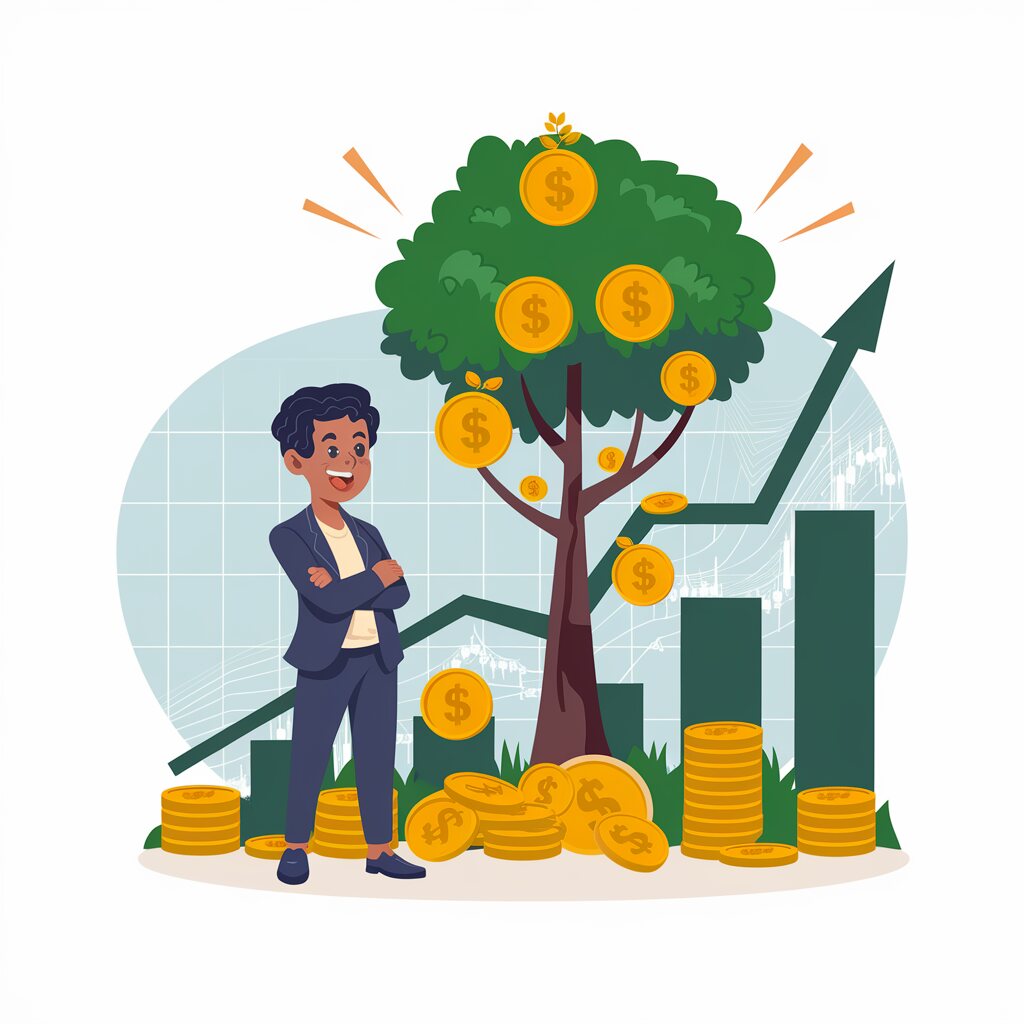
Early investing can greatly impact long-term financial security, ensuring the creation of a solid financial portfolio. Creating early investment plans allows investing in diverse markets and monetary assets to grow over the long term as it balances out market fluctuations and possibly recovers from market downturns, salvaging all the market risks.
Investing early provides flexibility and security for financial goals. Individuals have more time to adapt to the financial goals and implement strategies as the market evolves. Moreover, investing in early retirement can empower you to explore more adventures by retiring early.
Benefits of investing early is enriching in the later stages of life. Most of us have been told to save more for retirement. But what if I told you that investing is a better option than saving for the retirement stage? As we know, the economy grows over time and companies earn more, ensuring the market rises.
Therefore, investing in stocks and other securities can help build strong wealth. Investing early in stocks, mutual funds, forex, and other assets creates a compounding effect and modest contribution over the years. Keep reading to find out more about the benefits of investing early, how to start investing at an early stage, how it impacts the future, and others.
Starting early ensures greater advantages over market fluctuations. Investing for a longer period provides balance to the investing portfolio, allowing the smallest contributions to potentially grow over time. Traders only need to invest a small amount of their wealth, potentially reaping higher returns from long-term assets.
Early investing promotes numerous advantages. It helps to build a strong investing portfolio and secure financial risks over the long run. Some of the advantages are given below:
Starting early encourages the investment portfolio to grow over time. Compounding investing works by profiting through the earnings. The returns from the investment are subjected to compounding power, enabling them to increase the potential returns over time. The more you contribute in each interval, it results in compounding power
Early investment is a way to balance out market fluctuations and earn huge. Long-term investing can contribute hugely to the investment portfolio. The market rises over the long term. Early investing in various assets allows your investment to grow as the respective securities or assets grow. Moreover, it is historically known that investment vehicles have generated huge profits over time.
Young investors can take more risks because of the long time interval to recover from market downturns, reducing the potential risks. Over a long time, the market usually corrects itself from overbought and oversold conditions, especially the stock market. This allows early investors to let their securities and assets liquidate themselves in the market and allows them to grow with the potential increase.
While pursuing education, it is usual to pay for the studies with loans. However, dwindling with more loans than what you could pay could lead to the trouble of the loan trap. Therefore, be wise to only apply for loans you could pay for. But if you plan to invest in the early stages, then these loans can be easily paid off with the investment return. Early investing is a powerful tool for becoming debt-free.
Long-term investing allows one to explore more investing opportunities and strategies from mutual funds, stocks, and other securities. It helps to obtain an in-depth understanding of how these operate and the risks associated with them. Get insight on various financial instruments to help grow your investment portfolio. In addition to investment, financial literacy and saving and managing expenses are crucial for overall progress.
Another benefit of investing early is financial discipline. At the initial stage of investing, there may be some setbacks due to a lack of knowledge or becoming impatient. However, as we continue investing, we learn the dynamics of investing, such as making informed decisions, monitoring, and regulating as per market trends and updates. Financial discipline is something you learn by controlling your emotions and strategising your decisions. Once you achieve financial discipline, then you can become a great investor.
Regular investing for a long period empowers compounding growth, generating huge wealth. Cultivating disciplined investing habits can lead to a significant accumulation of wealth and financial security. Diversifying investment portfolios in various securities can lead to accumulating huge wealth over time. Moreover, early investment provides more time to understand and adapt to the market. As you grow your knowledge and experience, you learn about different strategies and refine them to get maximum profits by avoiding mistakes and taking advantage of the opportunity.
Traders can earn a gigantic profit through early investment plans. Moreover, it can help to afford major life events such as buying a house or starting a family. By investing early, you are more likely to reach financial goals sooner. This is because you will be starting to invest early, allowing you to expand the investment portfolios over various financial instruments, resulting in achieving financial flexibility without any stress.
The key step to beginning investment at an early stage is to create an investment plan and educate yourself about financial literacy. Open a trading account to put investment plans into action. Initially, use a demo account to get the gist of the investment experience. Practice yourself by investing in various stocks, bonds, and other securities to learn how it works.
Begin an investment account and start investing any amount, depending on your budget and financial goals. The ideal amount to invest is a small portion of the budget. Generate a plan on how to invest money using earnings. Take advantage of the compounding effect to potentially grow. Evaluate earnings and implement strategies and risk management practices to prevent losses due to market fluctuations. Build your portfolio by diversifying your investments in various assets. Keep updated on market trends, policies, regulations, and economic events to stay ahead.
There is no specific age to begin investing. As the saying goes, “It is better late than never.” You can begin investing at any age. Starting at an early age has greater benefits for generating wealth. If you begin investing in your early 20s, taking advantage of compound interest would be enough to pay off in your 30s. Furthermore, investing regularly throughout the career can accumulate a larger amount of wealth enough to spend lavishly on retirement
The benefits of investing early are crucial for the future, such as planning retirements. Starting to invest as early as your 20s can help you create a profound investment portfolio.
Utilising financial literacy can help outweigh market risks by implementing strategies and making risk management decisions. Diversifying the market at a young age has the potential to fund the retirement phase. Starting early and investing regularly has the benefit of balancing market fluctuations. As the market is expected to grow day by day, investments in stocks, mutual funds, and other securities are bound to grow together.
It doesn’t matter what age you are; you can start investing by educating yourself about investment options and utilising the investment plans per your needs. Create an investment plan and financial goals to achieve. Monitor regularly and employ strategies according to market trends. Wealth creation is a long-term process. Therefore, disciplined investing and adapting to the market over time are the keys to success.
Disclaimer: The information provided in this blog is for educational and informational purposes only and should not be considered as financial or investment advice. Stock market investments are subject to market risks, and past performance is not indicative of future results. Readers are encouraged to do their own research and consult with a licensed financial advisor before making any investment decisions. The author and publisher are not liable for any financial losses or damages incurred from following the information provided in this blog.

Ibnu Jala
Ibnu Jala is an experienced professional in the financial markets of India and the Middle East, renowned for his trading expertise and mentorship. His passion for neuroscience drives his research, blending finance and science seamlessly. With a Bachelor’s in Law from India and an MBA from the UK, Ibnu Jala has a diverse academic background. In addition to being a seasoned investor and serial entrepreneur, he currently leads FinQuo Versity as its CEO.
